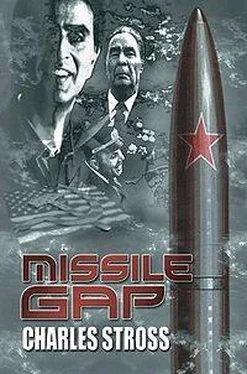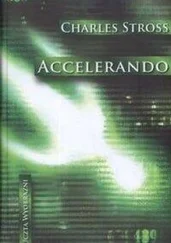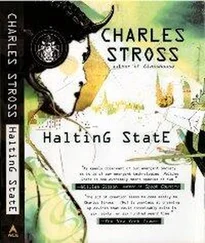Chapter Five: Cannon-Fodder
Madeleine and Robert Holbright are among the last of the immigrants to disembark on the new world. As she glances back at the brilliant white side of the liner, the horizon seems to roll around her head, settling into a strange new stasis that feels unnatural after almost six months at sea.
New Iowa isn't flat and it isn't new: rampart cliffs loom to either side of the unnaturally deep harbor (gouged out of bedrock courtesy of General Atomics). A cog-driven funicular railway hauls Maddy and Robert and their four shipping trunks up the thousand-foot climb to the plateau and the port city of Fort Eisenhower — and then to the arrival and orientation camp.
Maddy is quiet and withdrawn, but Bob, oblivious, natters constantly about opportunities and jobs and grabbing a plot of land to build a house on. "It's the new world," he says at one point: "why aren't you excited?"
"The new world," Maddy echoes, biting back the urge to say something cutting. She looks out the window as the train climbs the cliff-face and brings them into sight of the city. City is the wrong word: it implies solidity, permanence. Fort Eisenhower is less than five years old, a leukaemic gash inflicted on the landscape by the Corps of Engineers. The tallest building is the governor's mansion, at three stories. Architecturally the town is all Wild West meets the Radar Age, raw pine houses contrasting with big grey concrete boxes full of seaward-pointing Patriot missiles to deter the inevitable encroachment of the communist hordes. "It's so flat."
"The nearest hills are two hundred miles away, past the coastal plain — didn't you read the map?"
She ignores his little dig as the train squeals and clanks up the side of the cliff. It wheezes asthmatically to a stop besides a wooden platform, and expires in a belch of saturated steam. An hour later they're weary and sweated-up in the lobby of an unprepossessing barrack-hall made of plywood. There's a large hall and a row of tables and a bunch of bored-looking colonial service types, and people are walking from one position to another with bundles of papers, answering questions in low voices and receiving official stamps. The would-be colonists mill around like disturbed livestock among the piles of luggage at the back of the room. Maddy and Robert queue uneasy in the damp afternoon heat, overhearing snippets of conversation. "Country of origin? Educational qualifications? Yes, but what was your last job?" Religion and race — almost a quarter of the people in the hall are refugees from India or Pakistan or somewhere lost to the mysterious east forever — seem to obsess the officials. "Robert?" she whispers.
"It'll be alright," he says with false certainty. Taking after his dad already, trying to pretend he's the solid family man. Her sidelong glance at him steals any residual confidence. Then it's their turn.
"Names, passports, country of origin?" The guy with the moustache is brusque and bored, irritated by the heat.
Robert smiles at him. "Robert and Madeleine Holbright, from Canada ?" He offers their passports.
"Uh-huh." The official gives the documents a very American going-over. "What schooling have you done? What was your last job?"
"I've, uh, I was working part-time in a garage. On my way through college — I was final year at Toronto, studying structural engineering, but I haven't sat the finals. Maddy — Maddy's a qualified paramedic."
The officer fixes her with a stare. "Worked at it?"
"What? Uh, no — I'm freshly qualified." His abrupt questioning flusters her.
"Huh." He makes a cryptic notation against their names on a long list, a list that spills over the edge of his desk and trails towards the rough floor. "Next." He hands the passports back, and a couple of cards, and points them along to the row of desks.
Someone is already stepping up behind them when Maddy manages to read the tickets. Hers says TRAINEE NURSE. Robert is staring at his and saying "no, this is wrong."
"What is it, Bob?" She looks over his shoulder as someone jostles him sideways. His card reads LABORER (unskilled); but she doesn't have time to read the rest.
Chapter Six: Captain's Log
Yuri Gagarin kicks his shoes off, loosens his tie, and leans back in his chair. "It's hotter than fucking Cuba !" he complains.
"You visited Cuba, didn't you, boss?" His companion, still standing, pours a glass of iced tea and passes it to the young colonel-general before drawing one for himself.
"Yeah, thanks Misha." The former first cosmonaut smiles tiredly. "Back before the invasion. Have a seat."
Misha Gorodin is the only man on the ship who doesn't have to give a shit whether the captain offers him a seat, but he's grateful all the same: a little respect goes a long way, and Gagarin's sunny disposition and friendly attitude is a far cry from some of the fuckheads Misha's been stuck with in the past. There's a class of officer who thinks that because you're a zampolit you're somehow below them, but Yuri doesn't do that: in some ways he's the ideal New Soviet Man, progress personified. Which makes life a lot easier, because Yuri is one of the very few naval commanders who doesn't have to give a shit what his political officer thinks, and life would be an awful lot stickier without that grease of respect to make the wheels go round. Mind you, Yuri is also commander of the only naval warship operated by the Cosmonaut Corps, which is a branch of the Strategic Rocket Forces, another howling exception to the usual military protocol. Somehow this posting seems to be breaking all the rules…
"What was it like, boss?"
"Hot as hell. Humid, like this. Beautiful women but lots of dark-skinned comrades who didn't bathe often enough — all very jolly, but you couldn't help looking out to sea, over your shoulder. You know there was an American base there, even then? Guantanamo. They don't have the base now, but they've got all the rubble." For a moment Gagarin looks morose. "Bastards."
"The Americans."
"Yes. Shitting on a small defenseless island like that, just because they couldn't get to us any more. You remember when they had to hand out iodine tablets to all the kids? That wasn't Leningrad or Gorky, the fallout plume: it was Havana. I don't think they wanted to admit just how bad it was."
Misha sips his tea. "We had a lucky escape." Morale be damned, it's acceptable to admit at least that much in front of the CO, in private. Misha's seen some of the KGB reports on the US nuclear capabilities back then, and his blood runs cold; while Nikita had been wildly bluffing about the Rodina's nuclear defenses, the Americans had been hiding the true scale of their own arsenal. From themselves as much as the rest of the world.
"Yes. Things were going to the devil back then, no question: if we hadn't woken up over here, who knows what would have happened? They out-gunned us back then. I don't think they realized." Gagarin's dark expression lifts: he glances out of the open porthole — the only one in a private cabin that opens — and smiles. "This isn't Cuba, though." The headland rising above the bay tells him that much: no tropical island on earth supported such weird vegetation. Or such ruins.
"Indeed not. But, what about the ruins?" asks Misha, putting his tea glass down on the map table.
"Yes." Gagarin leans forward: "I was meaning to talk to you about that. Exploration is certainly in line with our orders, but we are a trifle short of trained archaeologists, aren't we? Let's see: we're four hundred and seventy thousand kilometers from home, six major climactic zones, five continents — it'll be a long time before we get any settlers out here, won't it?" He pauses delicately. "Even if the rumors about reform of the penal system are true."
Читать дальше












